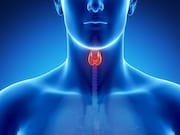ThyroSeq v3 has 94 percent sensitivity, 82 percent specificity for Bethesda III and IV nodules
FRIDAY, Nov. 9, 2018 (HealthDay News) — A multigene genomic classifier (GC) test for thyroid nodules with indeterminate cytology shows high sensitivity and negative predictive value, according to a study published online Nov. 8 in JAMA Oncology.
David L. Steward, M.D., from the University of Cincinnati Medical Center, and colleagues conducted a prospective study at 10 medical centers to determine the diagnostic accuracy of a GC test (ThyroSeq v3) for cytologically indeterminate thyroid nodules. A total of 256 patients with 286 nodules met the eligibility criteria; central pathology review was performed on 274 nodules.
The researchers found that 72 percent of the 286 nodules were benign, 24 percent were malignant, and 4 percent were noninvasive follicular thyroid neoplasms with papillary-like nuclei (NIFTP). Overall, 257 nodules (154 Bethesda III, 93 Bethesda IV, and 10 Bethesda V) had informative GC analysis; 61 and 39 percent were classified as negative and positive, respectively. The test demonstrated a 94 percent sensitivity and 82 percent specificity in Bethesda III and IV nodules. The negative predictive value was 97 percent, and the positive predictive value was 66 percent with a cancer/NIFTP prevalence of 28 percent. The 3 percent false-negative rate was comparable to that of benign cytology.
“Beyond simply differentiating benign and malignant nodules, the study shows that ThyroSeq also provides a detailed genetic profile of the positive nodules,” Steward said in a statement. “ThyroSeq potentially allows physicians to employ a precision medicine approach, modifying treatment for each patient based on the mutations present.”
The University of Pittsburgh Medical Center granted CBLPath Inc. a license to market ThyroSeq for commercial use.
Copyright © 2018 HealthDay. All rights reserved.








